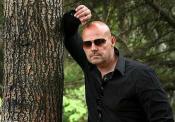 Bubbi Morthens (born June 6, 1956 in Reykjavík, Iceland[1]), is a singer and songwriter from Iceland. His name of birth is Ásbjörn Kristinsson Morthens, Bubbi being the affectionate form of Ásbjörn.
Bubbi Morthens (born June 6, 1956 in Reykjavík, Iceland[1]), is a singer and songwriter from Iceland. His name of birth is Ásbjörn Kristinsson Morthens, Bubbi being the affectionate form of Ásbjörn.
Contents
Bubbi Morthens recorded his first solo album in 1979, a blend of rock, blues and reggae, and published it the following year with the title of Ísbjarnarblús which led him to popularity in Iceland due to influences of Iggy Pop and other artists, the changes of music styles during the recording sessions, but particularly due to the lyrics as their content was embedded in the social struggle, especially of the lower classes from the fishing industry to migrant workers.
His first important band was Utangarðsmenn (The Outsiders), a punk band that led the new wave movement in Iceland and was formed by guitarists Michael D. Pollock (Mickey Dean) and Daniel Pollock (Dirty Dan), drummer Magnús Stefánsson (mad Dog Magoo), and finally bassist Rúnar Erlingsson (Rooney the Ripper).
Utangarðsmenn gained renown in Iceland by means of extensive press coverage and several gigs, including three at Laugardalshöll, Iceland’s biggest sports arena, where one of the gigs they performed was as supporting band for The Clash. Bubbi left the band right after the fourth album, Í Upphafi Skyldi Endinn Skoða in 1981, and the other band members continued playing, but under the name of Bodies, which was a tribute to one of Utangarðsmenn’s songs.
At that time, Bubbi and his brother, Bergþór, were joined by bassist Þorleifur Guðjónsson and formed the band Egó, a name that some claimed was a reference to Bubbi’s great ego. The original group was extended when Jóhann Ridar (aka “Motorhead”) entered as the drummer, next to guitarist Ragnar Sigurðsson.
The band had their first tour in Reykjavík, but when they started to record, Jóhann and Ragnar had left the band and were replaced by Magnús Stefánsson and Tómas Magnús Tómasson, who joined as session musician and producer respectively. After these changes, the band's music improved, and their debut album, Breyttir Tímar which was released on April 1, 1982 became one of the best-selling albums in Icelandic music history, climbing to second place on the Icelandic album chart, and staying in the top ten for 19 weeks. During the promotional tour for the album in Iceland, Þorleifur left the band and was replaced by Rúnar Erlingsson.
Egó followed up with Í Mynd the same year and it was considered better than the previous album. With this release, Egó toured Scandinavia, where Magnús Stefánsson decided to leave the band and was replaced by Jökull Úlfsson, and the band was extended once more with the addition of Gunnar Rafnsson on keyboards. After achieving success, internal conflicts undermined the relationship with the record label, and even though the band had decided to break up, they had signed a contract by which they were obliged to release another album. Egó released their final work in 1984. The band split up, Bubbi left Iceland and the musicians continued along different paths. In 2001, Egó members were reunited to release a compilation under the title of Í Upphafi Skyldi Endinn Skoða.
Later in 1984, Bubbi returned to Iceland and formed a rock and roll band called Das Kapital and released an album called Lili Marlene, but the band broke up afterwards.
In 1985 he signed with Swedish record label Mistlur and released Frelsi til Sölu (Freedom for Sale) which helped bring further commercial success, until Dögun (Dawning), was released in 1987 and became a smash success. Bubbi’s popularity was finally established in 1990 with the release of Sögur af Landi, which received good reviews.
Towards 1987 Bubbi joined guitarist Þorsteinn Magnússon (former member of Þeyr), Jakob Smári Magnússon (former bassist of Tappi Tíkarrass), drummer Halldór Lárusson and keyboardist Tómas Magnús Tómasson to form a new group called MX-21. The band collaborated with Megas and Sykurmolarnir (later to be known as The Sugarcubes) on Skytturnar, the soundtrack to the film directed by Friðrik Þór Friðriksson.
By the early 1990s, Bubbi was planning to record a Spanish or South-American style album; this work was consolidated with the release of Von (Hope), which was recorded in Cuba with the band Sierra Maestra. It was an album that marked a change in his music style; with elaborate arrangements and performances, the lyrics are about loss and regret.
In 1993, Bubbi moved towards a mellow country music style with the release of Lífið er Ljúft (Life is Good), and in 1994 experimented with rap music in the album 3 Heimar (3 Worlds). Also in the ‘90s Bubbi joined Rúnar Júlíusson to form a rock band called G.C.D.. He also recorded a tribute album for his beloved crooner uncle, Haukur Morthens and a spoken word album of original poetry in 1996. In 1998, appeared Arfur (Heritage), an album for which he drew from traditional Icelandic rhymes and ballads.
Most of the works performed by Bubbi Morthens are in Icelandic. He is one of the all time best selling musicians in Iceland, but he has not gained popularity outside his country.
en:wikipedia